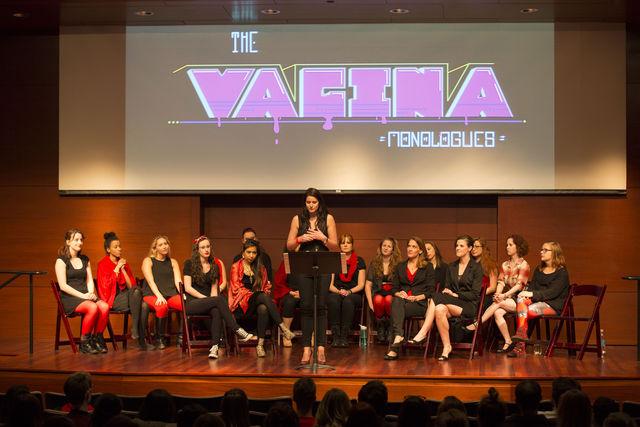Audiences may have heard the word “vagina” more in two hours at the Fort Douglas Post Theater than they had in their lifetimes previous to that point.
“The Vagina Monologues,” a collection of read-aloud stories from women about their relationships to their bodies, offered a chance for female U students to read Eve Ensler’s now famous feminist play over this past weekend.
Built from the experiences of individual people, not creations of someone else’s mind, “The Vagina Monologues” was insightful and engaging. The actors did their best to be vessels for the stories, treating them as they believed the stories’ original authors meant for them to be treated. Their efforts helped create a life-changing and mind-altering performance of a show well worth seeing.
All of the monologues were thoughtful — many were hard to hear, as they dealt with sensitive topics such as sexual abuse and violence. While not every performance uses the word “vagina,” the connotation is that it should be used and that the absence of the word implies a negative relationship between the women and their bodies, whether that implication comes from within or from outside pressures. When one of the speakers only refers to her vagina as “down there,” it felt almost jarring.
Another monologue that engaged with some women’s bad relationships with their vaginas involved two actors whose words focused on the horrifying reality of rape in war-torn countries, where sexual violence is simply a matter of course.
There were also a few that were funny. For example, in the monologue inspired by a sex worker who serviced only women, the reader acted out the different kinds of moaning the author had heard during her years on the job. She got some great laughs, while also showing the audience what it means to be a sex worker and why some women willingly do it.
But in this monologue as well, there were some flawed moments detracting from the show’s power. In the monologue of the sex worker, she described a moan entitled the “empowered black woman.” While likely meant well, the title seemed vaguely racist. Additionally, the monologue with four women reading the experience of a transgender woman, while an empowering and great perspective to include, also implied that all transgender woman must have a vagina to be valid, which excludes many of of those who cannot afford, are not allowed or choose to not have vaginoplasty surgery. These trans women are still women, and it is unfortunate that “The Vagina Monologues” does not explicitly acknowledge that.
c.koldewyn@dailyutahchronicle.com


